LED Wristbands Market Research, 2032
The global led wristbands market was valued at $168.4 million in 2022, and is projected to reach $807.4 million by 2032, growing at a CAGR of 17.1% from 2023 to 2032.LED wristbands are powered by LED chips that are strategically inserted inside the wristband material. These chips are programmed to produce a variety of colors and intensities, resulting in dynamic light displays. Wristbands are often comprised of flexible and robust materials, ensuring comfort and longevity. LED wristbands are programmable, allowing organizers to synchronize them with music, remotely alter their colors, and even create interactive light shows. This programmability improves the user experience and adds to the overall mood of an event. LED wristbands are widely used in live entertainment, especially during concerts and music festivals. These wristbands have transformed audience interaction, making them a vital part of the event.
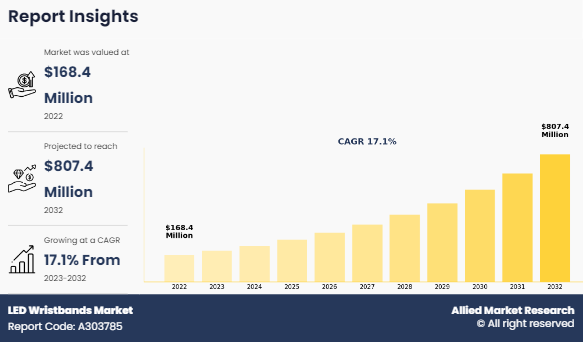
One of the main benefits of LED wristbands is their great level of customization. Event organizers can modify the lighting effects, colors, and patterns to match the event's theme or mood. This amount of personalization improves the overall design and provides guests with a unique experience. LED wristbands industry are less harmful to the environment than regular disposable wristbands. They are reusable and rechargeable, which reduces event waste.
This environmentally conscious approach is consistent with the increasing global emphasis on sustainability, making LED wristbands an appropriate choice for event organizers. LED wristbands market size are made to be strong and long-lasting. The materials utilized in its construction provide resistance to water, perspiration, and regular wear and tear. This resilience ensures that the wristbands may be reused for several events, reducing organizers' expenses. LED wristbands market growth are flexible accessories that may be used at a variety of occasions. Whether it is a high-energy music festival, a formal corporate meeting, or a sporting event, the configurable features allow for adaption to different settings. Owing to their adaptability, LED wristbands market demand are an invaluable tool for event planners that cater to a wide range of audiences.
The power supply for LED wristbands is a crucial issue. Most of these bands use batteries to power the LEDs. While current batteries have improved in terms of efficiency and longevity, they still present issues. Regular battery changes or recharging might be challenging, especially during large-scale events or when a significant number of wristbands are in use. This reliance on batteries also contributes to electronic waste, as used batteries must be properly disposed of to prevent environmental damage. Another noteworthy issue is that LEDs have a limited lifetime. Over time, the brightness and functionality of LEDs diminish, affecting the wristbands' overall performance.
This degradation is unavoidable owing to the physical qualities of the materials used in LED production. Connectivity concerns can potentially reduce the usefulness of LED wristbands. Many of these gadgets are designed to be synchronized or controlled remotely in order to produce coordinated light displays. However, signal interference, range limitations, and technological malfunctions can all disturb synchronization. In large events or packed places, establishing a consistent and synchronized light show for all wristbands might be difficult, detracting from the desired visual effect.
Unlike traditional wristbands, their electronic versions may be simply programmed to show a variety of colors, patterns, and even messages. For example, in a concert, LED wristbands synchronized with the music may produce a visually dazzling light display that immerses the audience in a multisensory experience. This versatility goes beyond entertainment events to business activities, product launches, and athletic competitions, where marketers may use LED wristbands to express customized messages and improve brand identity.
Furthermore, the interactivity of LED wristbands enhances their attraction. By combining motion sensors or Bluetooth connectivity, these wristbands may respond to particular stimuli, such as clapping or motions, providing users with an engaging and interactive experience. In a business conference, for example, attendees may use their LED wristbands to engage in live polls or Q&A sessions, creating a sense of inclusion and involvement. The rising emphasis on event safety and security provides another important opportunity for LED wristbands market players. These wristbands, which may illuminate in various colors, might be used as visual identifiers for distinct groups or occasions. In an emergency, organizers may use the wristbands to direct guests to specific exits or assembly locations, improving crowd control and safety precautions.
Competitive Landscape
The key players profiled in this report include LG Electronics, Sony, Panasonic, Osram Lighting, Philips, GE Lighting, Sharp Corporation, Samsung, Cree Lighting, and Hitachi. Partnerships & collaborations and marketing & branding are common strategies followed by major market players. For instance, on August 9, 2023, CrowdLED the European leader in LED wristbands technology unveiled the future of LED wristbands for live events.
The LED wristbands market is segmented on the basis of price, functionality, distribution channel, and region. By price, the market classified into is low price and high price. By functionality, the market is classified into with smart functionality and without smart functionality. By distribution channel, the market is classified into online retailing and offline retailing. By region, the market is analyzed across North America, Europe, Asia-Pacific, and LAMEA.
Segment Analysis
The led wristbands market is segmented into Price, Functionality and Distribution Channel.
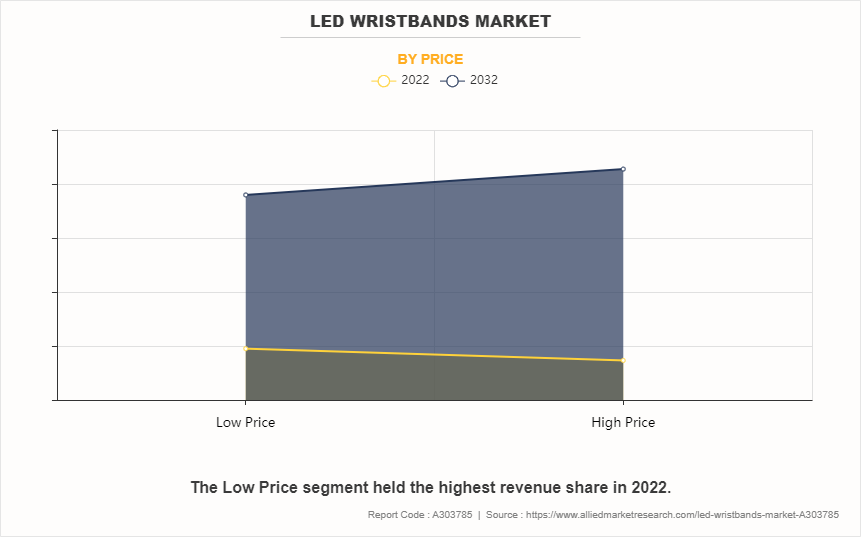
By price, the low price sub-segment dominated the global LED wristbands market share in 2022. The cost of raw materials, such as the LED components, the wristband material, and the electronics used, can greatly impact the overall manufacturing cost. In the low-price segment, manufacturers often look for cost-effective materials to keep prices down. The manufacturing processes used can influence the cost of production. Efficient and streamlined manufacturing processes can contribute to lower production costs, allowing manufacturers to offer products at a lower price. Large-scale production often leads to economies of scale, where the average cost per unit decreases as production volumes increase. Manufacturers producing LED wristbands in bulk may be able to pass on cost savings to consumers. Intense competition in the LED wristbands market can cause prices to drop. Manufacturers may engage in price wars to gain market share, especially in the low-price segment where consumers are often more price-sensitive.
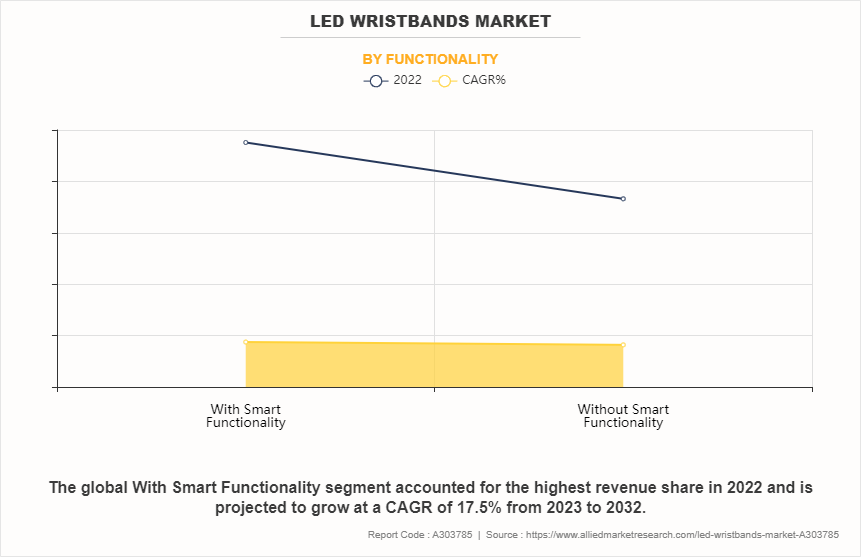
By functionality, the with smart functionality sub-segment dominated the global LED wristbands market share in 2022. LED wristbands are often used in concerts, music festivals, and other entertainment events to enhance the overall experience of the audience. These wristbands can be synchronized with the music, creating stunning light shows and interactive experiences for the attendees. Moreover, event organizers use smart LED wristbands to engage the audience actively. By incorporating interactive features, such as responding to crowd noise or smartphone apps, the wristbands enhance audience participation. LED wristbands are often used in corporate events and team-building activities to foster a sense of unity among participants. Consumers are drawn to products that allow for personalization and customization. LED wristbands with smart functionality often offer options for users to customize colors, patterns, and messages, providing a unique and personalized experience. As awareness regarding smart LED wristbands increases, more individuals and organizations are adopting them for various purposes, further driving market growth.
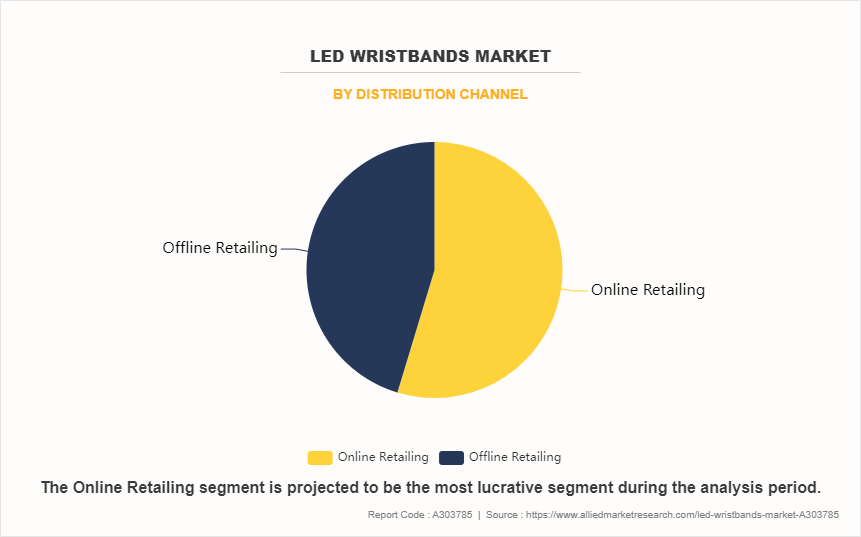
By distribution channel, the online retailing sub-segment dominated the global LED wristbands market share in 2022. Online retail platforms provide a global reach, allowing LED wristband manufacturers to tap into a broader customer base beyond their local markets. Accessibility is enhanced as customers can easily browse and purchase LED wristbands from anywhere in the world, increasing the market potential. Online retailing offers convenience, allowing customers to browse and purchase LED wristbands at any time, eliminating the constraints of physical store hours. The ease of comparison, reading reviews, and accessing product information online contributes to a seamless purchasing experience. Online platforms enable manufacturers and retailers to showcase a diverse range of LED wristbands, catering to various customer preferences and needs.
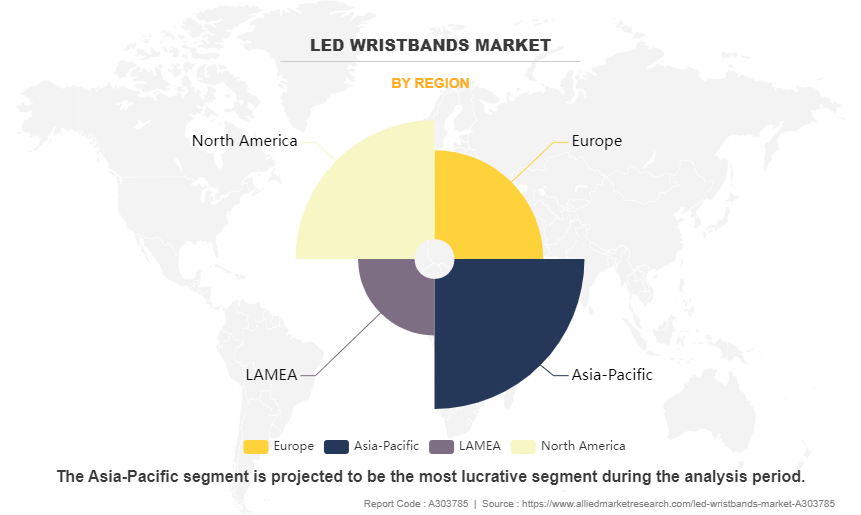
By region, Asia-Pacific dominated the global LED wristbands market in 2022. Asia-Pacific is a popular destination for tourism and events. Hotels, resorts, and tourist attractions may use LED wristbands as part of their guest experience, offering unique features or promotions. LED wristbands are often used in concerts, festivals, and other live events to enhance the audience experience. The vibrant and customizable lighting effects of LED wristbands contribute to the overall atmosphere of the event. Ongoing advancements in LED technology may lead to more cost-effective and feature-rich LED wristbands. As technology improves, these wristbands may become more accessible and appealing to a broader consumer base. Companies and brands in the region often use LED wristbands for promotional events and marketing campaigns. The customizable nature of LED wristbands allows for creative branding opportunities, making them attractive for marketing purposes.
Key Benefits For Stakeholders
- This report provides a quantitative analysis of the LED wristbands market forecast segments, current trends, estimations, and dynamics of the led wristbands market analysis from 2022 to 2032 to identify the prevailing led wristbands market opportunities.
- The market research is offered along with information related to key drivers, restraints, and opportunities.
- Porter's five forces analysis highlights the potency of buyers and suppliers to enable stakeholders make profit-oriented business decisions and strengthen their supplier-buyer network.
- In-depth analysis of the LED wristbands market statistics segmentation assists to determine the prevailing market opportunities.
- Major countries in each region are mapped according to their revenue contribution to the global market.
- Market player positioning facilitates benchmarking and provides a clear understanding of the present position of the market players.
- The report includes the analysis of the regional as well as global led wristbands market trends, key players, market segments, application areas, and market growth strategies.
LED Wristbands Market Report Highlights
| Aspects | Details |
| Market Size By 2032 | USD 807.4 million |
| Growth Rate | CAGR of 17.1% |
| Forecast period | 2022 - 2032 |
| Report Pages | 307 |
| By Price |
|
| By Functionality |
|
| By Distribution Channel |
|
| By Region |
|
| Key Market Players | Hitachi, LG Electronics, Sony, GE Lighting, Cree Lighting, Samsung, OSRAM LIGHTING PRIVATE LIMITED., Panasonic, Sharp Corporation, Philips |
The LED wristbands market size is expected to grow due to growing popularity of live events globally. In addition, the market is driven by rising demand for interactive experiences.
The major growth strategies adopted by the LED wristbands market players are partnerships & collaborations and marketing & branding.
North America will provide more business opportunities for the global LED wristbands market in the future.
LG Electronics, Sony, Panasonic, Osram Lighting, Philips, GE Lighting, Sharp Corporation, Samsung, Cree Lighting, and Hitachi are the major players in the LED wristbands market.
The with smart functionality sub-segment of the functionality segment acquired the maximum share of the global LED wristbands market in 2022.
Event management companies are the major customers in the global LED wristbands market.
The report provides an extensive qualitative and quantitative analysis of the current trends and future estimations of the global LED wristbands market from 2022 to 2032 to determine the prevailing opportunities.
As nightclubs and entertainment venues incorporate LED wristbands to enhance the nightlife experience, there is projected to be an increase in adoption of LED wristbands.
Integration with wearable tech and smart devices, rise in use in virtual and hybrid events, and surge in demand for brand activations and marketing campaigns to drive the global LED wristbands market.
Loading Table Of Content...
Loading Research Methodology...



